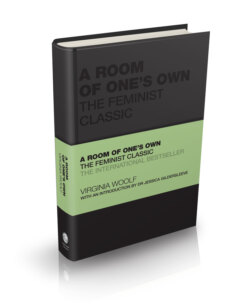Читать книгу A Room of One's Own - Virginia Woolf - Страница 7
WHY IT MATTERS
ОглавлениеThe question of a woman having a room of her own in which to work and write is as pertinent today as it was almost a century ago.
Indeed, I sit at my kitchen table to write this essay, as hundreds of thousands of women have done before me. It is not my own room, but such things remain a luxury for most women. The table will do. I am fortunate that I can make a living ‘by my wits,’ as Woolf has it. That living enabled me to buy not only the room, but the house – although the presence of my young family means that a room of my own is currently an unattainable luxury. My living as an (academic) writer does, however, enable me to purchase safe and reliable childcare, in which the physical and emotional labour of other women permits me to sit here and write. It is as true today, therefore, as it was almost a century ago when Woolf said, ‘a woman must have money and a room of her own if she is to write fiction’ – indeed, to write anything at all.
Woolf's book‐length essay began as a series of lectures she delivered to female students at the University of Cambridge year prior to publication. Its central premise and title has entered the popular lexicon: former Australian Prime Minister Julia Gillard's podcast, A Podcast of One's Own, takes its lead from the essay, as does Anonymous Was A Woman, a prominent arts funding body based in New York. A 1980s pop rock group, Shakespears Sister (sic), took its name from The Smiths song Shakespeare's Sister, Morrissey's reflection on Woolf's idea that if the Bard had had a sister of equal genius, she would not have been given the opportunity to express it. Even the Bechdel–Wallace test, which measures the success of a narrative according to whether it features at least two named women, conversing about something other than a man, can be seen to descend from the ‘Chloe liked Olivia’ section of A Room of One's Own. In the imagined novel Woolf references, Chloe and Olivia not only like one another, but their conversation and lives exist outside of any male or patriarchal identification. Finally, Woolf's observation of women as a kind of underclass, in which their work is not recompensed at the same rate as work by men, still holds relevance in relation to today's gender pay gaps – as does the hierarchy of value placed on men's over women's writing, which has led to the necessary establishment of awards like the Women's Prize for Fiction in the United Kingdom and the Stella Prize in Australia.
Yet it is also necessary for contemporary feminists to recognise that, as important as A Room of One's Own has been for feminism in general and for women's writing in particular, there are assumptions and limitations inherent in Woolf's argument, which we will address.
